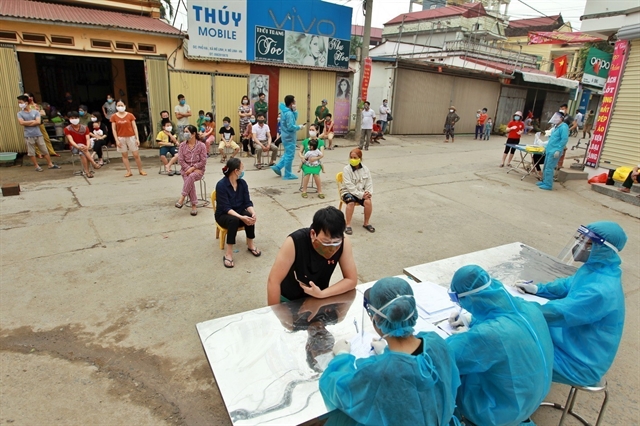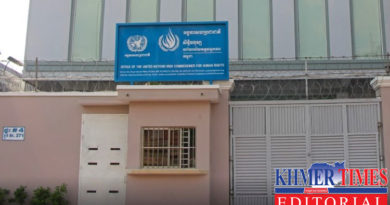COVID-19 PANDEMIC Day 140: ASIA & PACIFIC -Three new relapse cases, no new infections
No new cases of COVID-19 were reported yesterday, but three more recovered patients were found to have tested positive for a second time, bringing the current total of recurring cases to 11.

Three new relapse cases, no new infections

No new cases of COVID-19 were reported yesterday, but three more recovered patients were found to have tested positive for a second time, bringing the current total of recurring cases to 11.
.
<covid-19>
.
PHNOM PENH-
.
.

Ads by: Memento Maxima Digital Marketing
@ [email protected]
– SPACE RESERVE FOR YOUR ADVERTISEMENT
MANILA, Philippines-BREAKING: COVID-19 cases in PH reach 5,223
MANILA, Philippines — There are now over 5,000 coronavirus disease (COVID-19) cases in the country as the Department of Health (DOH) reported 291 new cases on Tuesday, bringing the country’s total cases to 5,223 as of 4 p.m. of April 14.
The disease has also claimed the life of 20 more individuals, bringing the COVID-19 death toll to 335.
The DOH also recorded 53 new recoveries, raising the total of patients beating COVID-19 to 295.
.
RELATED STORY:
Highest recoveries in a day set at 53.
With mass testing for the novel coronavirus starting Tuesday, the Department of Health announced the highest number of new recoveries from COVID-19 for one day at 53, which resulted in a total of 295 recoveries as of April

The new confirmed cases of 291 brought total coronavirus cases in the Philippines to 5,223. The DOH has yet to announce the first batch of data from those undergoing the mass testing at 10 approved centers across the country.As 20 more patients lost their battle to COVID-19, the death toll from the disease climbed to 335.This developed as President Rodrigo Duterte, to enable the government to conduct more COVID-19 tests, has approved the purchase of rapid test kits, polymerase chain reaction machines and consumables, automatic extracting machines, and biomedical freezers.Inter-Agency Task Force spokesman Cabinet Secretary Karlo Nograles said that while the DOH cannot directly procure the rapid test kits due to the absence of approval from the Health Technology Assessment Council, the government could bypass the restrictions by ordering the Office of Civil Defense to make the purchase.“I’m clearing the way. I will ask Secretary Francisco Duque to talk to the people in charge, Secretary Carlito Galvez. And they can proceed to buy it immediately,” President Duterte said in a late Monday night meeting.The IATF for the Management of Emerging Infectious Disease said that the laboratory-based PCR will remain the “gold standard” of testing.National Task Force against COVID-19 chief implementer Carlito Galvez Jr. said the government will need to purchase 900,000 polymerase chain reaction-based kits to confirm the validity of results obtained from the use of rapid test kits.Galvez said PCR-based kits are expected to cost around P3.2 billion as the government is eyeing to buy two-million rapid test kits.The DOH earlier said it does not recommend the use of rapid test kits because they can produce false positives and false negatives.Rapid test kits can only detect the antibodies produced by the body to combat the disease and are prone to false negatives or false positives even if these can produce results faster than PCR-based kits, he said.Galvez said the DOH needs to test about 15,000 people for possible coronavirus infection.He noted that of the 15,000 potential COVID-19 “suspects,” about 5,000 to 8,000 are in Metro Manila.
The Health department defines a COVID-19 “suspect” as someone who has symptoms of the respiratory disease and travel or residence in a hotspot of the disease or exposure to a confirmed or probable carrier.The country has 102,000 test kits and the government plans to buy some one million more units, Galvez said.Meanwhile, Senator Nancy Binay yesterday said the IATF should immediately address the lack of clear protocol in handling COVID-related fatalities, including cadaver management, storage, cremation and assistance to families.She said the families of those who died from COVID-19 are having a hard time securing death certificates because some LGUs and barangay officials do not know what the protocols are if a patient dies inside his or her home, and how to properly handle the bodies which can no longer be accommodated in mortuary freezers and crematoriums.The senator said because of the lack of clear guidelines from IATF, she has received reports that some private crematoriums are asking for P100,000 for the cremation of COVID-positive remains..Under the DSWD Revised Guidelines on AICS for burial assistance, the department will shoulder part of the funeral cost and the family can receive up to P10,000 assistance even if they do not submit a case study report.As of 2020, there are only 60 crematoriums operating nationwide, 90 percent of which are privately-owned, and 25 out of 60 are in Metro Manila. Only six are publicly-owned (Manila, Pasay, Mandaluyong, Quezon City, Dasmariñas City, and Antipolo City) and are mostly operated by the local government—but of the six, only five are operational and can only accommodate three to five cadavers a day.Senator Sherwin Gatchalian, meanwhile, emphasize the key role of local government units in the fight against COVID-19, saying they should follow the test, quarantine and treatment approach.He said LGUs should have more autonomy in procuring testing kits or setting up testing facilities to speed up detection of COVID-19 positive cases from every household living on every street within every barangay.This is what is being done in Valenzuela City, which has started local mass testing in cooperation with The Medical City, he said. In its agreement with the hospital, the TMC processes the tests and reserves 25 tests per day for Valenzuela City but that can be expanded to 50 depending on the workload.Based on the results, authorities will identify persons that need to be quarantined or isolated.“In Valenzuela, first to be tested are the sick and their household, their companions in the house, their relatives and even their neighbors,” he said./ by Vito Barcelo and Macon Ramos-Araneta
SINGAPORE- 334 new coronavirus cases in Singapore, bringing total to 3,252

SINGAPORE – Singapore reported 334 new coronavirus cases on Tuesday (April 14), bringing the total number of cases to 3,252 since the start of the outbreak.
Of the new cases, 198 are linked to known clusters, 22 are linked to other local cases, and 114 are as yet unlinked.
None was imported, said the Health Ministry’s director of medical services, Associate Professor Kenneth Mak, at a press conference on Tuesday (April 14).
Commenting on the unlinked cases, Prof Mak said they did not necessarily mean that there is an unknown source of transmission and, as a result, community spread.
Some of the numbers are from active testing done in different settings – not just in larger purpose-built dormitories, but also other smaller ones, and it takes time to compile and match the figures, he said.
“So, in fact, out of the proportion that are as yet unlinked, you will find that over the next few days that number whittles down progressively as we link them to existing clusters,” he added.
Giving an update on the work of an inter-agency task force a week after it was set up to support foreign workers, the Manpower Ministry Permanent Secretary Aubeck Kam said the teams deployed to all 43 purpose-built dormitories since last week have stabilised living conditions there.
Mr Kam said the next phase of operations, which is “very critical”, would involve putting in place medical support so workers can receive good treatment.
The task force plans to set up medical teams at all 43 dormitories by the middle of this week, said Prof Mak.
This is up from the seven medical teams that are currently deployed at the eight dormitories that have been gazetted as isolation areas.
Said task force commander, Chief Guards Officer Seet Uei Lim: “Now, our focus is on healthcare protection, and soon we will expand our healthcare capacity. The end state is to return to normalcy, ensure that dormitories can take care of our foreign friends.”
On the next steps, Brigadier-General Seet said: “We intend to meet the welfare needs of our foreign friends, and looking ahead, Ramadan is coming and we’re working with Muis on meeting the needs of our Muslim friends.”
He added that the task force will also “proactively case find to break the chain of infection” and rope in medical workers from the polyclinics and general practitioners to beef up medical support.
The task force was formed last Tuesday (April 7) to ensure foreign workers’ well-being and improve their living conditions after dormitories emerged as a source of concern during the outbreak.
At least 15 dormitories have emerged as clusters, with eight declared as isolation areas so far. This means that workers have to be quarantined in their rooms for 14 days.
To date, 7,000 healthy foreign workers in essential services have been relocated to 18 temporary housing locations, such as facilities that fall under the Ministry of Defence (Mindef), Ministry of Home Affairs, Ministry of Education and Sports Singapore.
This move is to minimise disruption to essential services, alleviate the load on public health amenities and minimise the risk of these healthy workers getting infected./ Toh Ting Wei Lim Min Zhang


All photographs, news, editorials, opinions, information, data, others have been taken from the Internet ..aseanews.net | [email protected] | Fo r comments, Email to : Al Bulario












